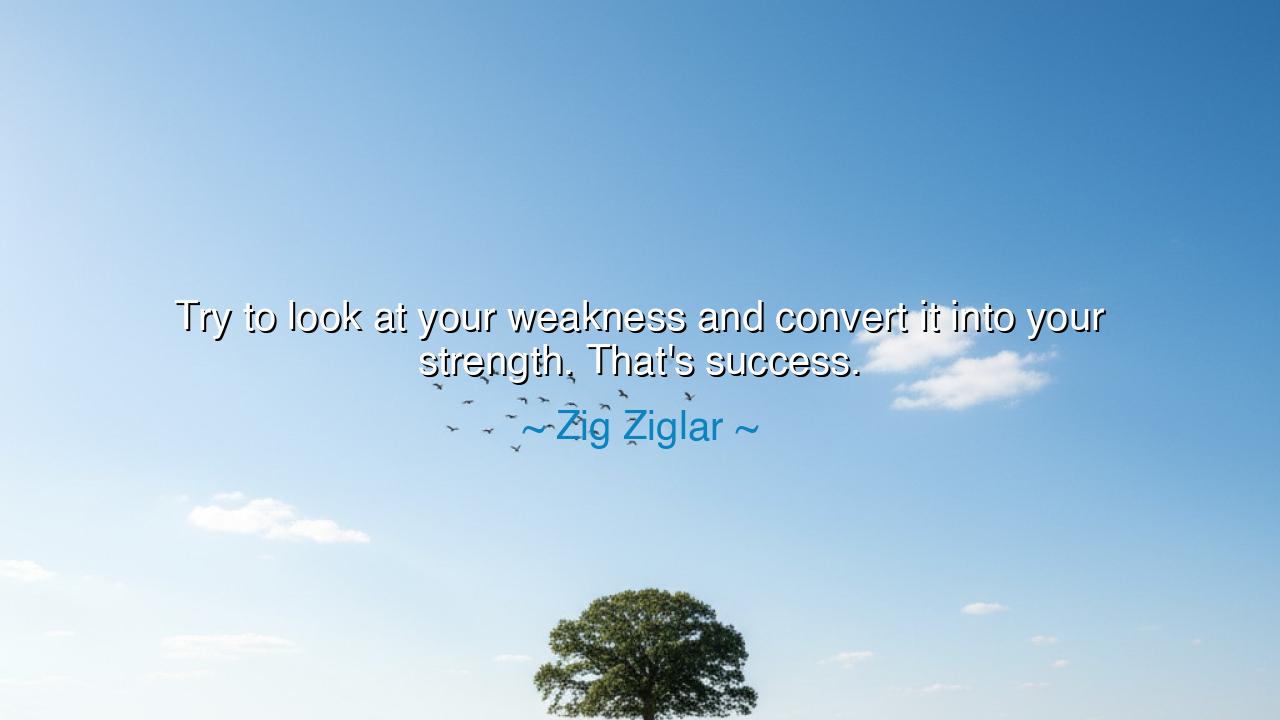
Try to look at your weakness and convert it into your strength.






When Zig Ziglar declared, “Try to look at your weakness and convert it into your strength. That’s success,” he spoke as a teacher of the eternal path of transformation. His words remind us that greatness is not found in the absence of flaw, but in the alchemy of turning flaw into power. Every human being is born with limitations, struggles, and shortcomings, yet within those very weaknesses lies the seed of strength. True success is not perfection, but the art of transfiguration: to make of one’s burdens a crown, and of one’s wounds a weapon.
The ancients would have called this the way of the hero. Consider the story of Achilles, whose swiftness was unmatched, but whose heel was his weakness. Though that weakness cost him in the end, the myth endured as a lesson: to know your vulnerable place is the first step in mastering yourself. Ziglar carries this lesson further—he urges not merely the knowledge of weakness, but its conversion. Where the hero of myth was undone by his flaw, the hero of wisdom is one who reshapes it into his advantage.
History offers many witnesses to this truth. Take Demosthenes, the great orator of Athens. As a youth, he had a weak and stammering voice, mocked by his peers. Yet instead of yielding to despair, he trained his speech relentlessly: speaking with pebbles in his mouth, reciting verses against the roar of the sea, forcing his weakness into submission. In time, the very flaw that once crippled him became his supreme strength—the power of persuasion that moved Athens and carved his name into the stone of history. This is Ziglar’s wisdom embodied: success is born when weakness becomes mastery.
There is also a spiritual dimension to this teaching. Many hide from their flaws, ashamed to admit them, fearing they reveal unworthiness. But Ziglar teaches the opposite: to confront weakness is not shame but courage. To transform it is not only victory, but redemption. The man who is timid can, by practice, become thoughtful and deliberate. The woman who is restless can, through discipline, become energetic and tireless. Each weakness carries within it the possibility of strength, if only we dare to shape it.
This wisdom is not limited to individuals, but to nations and peoples as well. The early Romans were known not for initial brilliance, but for their stubborn resilience. Their weakness was lack of refinement compared to Greece, but they converted that weakness into strength: a culture of discipline, law, and endurance. What they could not surpass in art, they made up for in order and might. Their empire grew from their ability to turn limitation into advantage, and the world was forever changed.
The lesson for us is clear: do not curse your weakness, but study it. Ask yourself: “What does this flaw demand of me? How can I train it into power?” If you are shy, let it drive you to become a deep listener. If you are impulsive, discipline yourself until you are decisive. If you lack knowledge, let that hunger fuel a lifetime of learning. The key is not to deny weakness, but to embrace it as raw material for strength.
Practically, this means cultivating self-awareness and persistence. Write down your greatest weakness. Then, map out how it might be trained, redirected, or transformed. Seek mentors who have walked this path, for often the strongest guides are those who once struggled most. Turn every stumbling block into a stepping stone, every failure into a lesson. Day by day, you will carve your weakness into your weapon.
Thus, Ziglar’s words thunder as both warning and promise: do not hide from your weakness, for it is the very doorway to your success. To the one who dares to convert pain into power, limitation into liberation, and burden into blessing—this alone is the path to victory. And so, children of tomorrow, remember: your weakness is not your end. It is your beginning. Use it, shape it, and rise.






AAdministratorAdministrator
Welcome, honored guests. Please leave a comment, we will respond soon